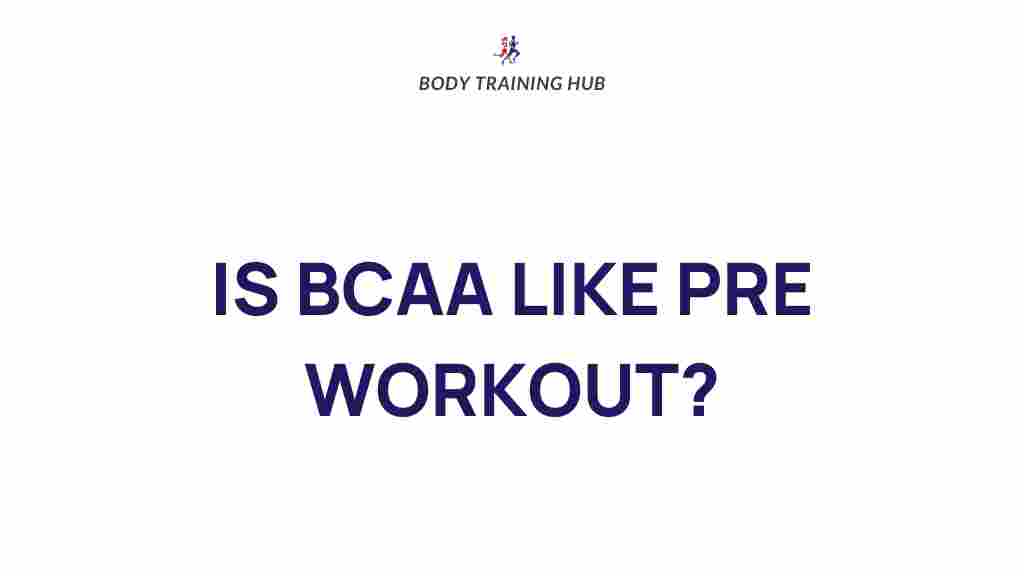BCAAs: Are They the Key to Unlocking Your Workout Potential?
In the world of fitness, the quest for optimal performance and muscle recovery has led many enthusiasts to explore various supplements. One such supplement that has gained widespread attention is BCAAs, or branched-chain amino acids. But what exactly are BCAAs, and how do they impact your workout, performance, and overall fitness? In this article, we will unravel the mystery of BCAAs, delve into their benefits, and help you decide if they are the right supplement for your training routine.
What Are BCAAs?
BCAAs consist of three essential amino acids: leucine, isoleucine, and valine. These amino acids are termed “branched-chain” due to their chemical structure, which resembles branches. Unlike other amino acids, BCAAs are primarily metabolized in the muscle rather than the liver, making them a vital fuel source during exercise.
Here’s a quick overview of each BCAA:
- Leucine: Known for its role in protein synthesis and muscle repair, leucine is often considered the most crucial of the three.
- Isoleucine: This amino acid helps with energy production and is involved in glucose metabolism.
- Valine: Valine supports muscle metabolism and helps prevent muscle breakdown during intense workouts.
The Benefits of BCAAs for Your Workout
Understanding the benefits of BCAAs can help you determine their effectiveness for your training goals. Here are some key advantages of incorporating BCAAs into your fitness routine:
- Enhanced Muscle Recovery: BCAAs have been shown to reduce muscle soreness post-exercise, allowing for quicker recovery times and less discomfort after intense workouts.
- Increased Muscle Growth: Leucine, in particular, plays a significant role in stimulating muscle protein synthesis, making BCAAs beneficial for those looking to build muscle mass.
- Reduced Fatigue: Supplementing with BCAAs can help decrease exercise-induced fatigue, which is particularly helpful during long training sessions or endurance events.
- Improved Exercise Performance: Research suggests that BCAAs can enhance overall workout performance by providing an additional energy source during prolonged exercise.
How to Use BCAAs for Optimal Results
To maximize the benefits of BCAAs, it’s essential to understand how to incorporate them into your fitness routine effectively. Here’s a step-by-step process:
Step 1: Determine Your Needs
Before adding BCAAs to your supplement regimen, assess your training intensity, duration, and goals. If you engage in high-intensity workouts or are training for endurance events, BCAAs may be particularly beneficial.
Step 2: Choose the Right Form
BCAAs are available in various forms, including powders, capsules, and ready-to-drink beverages. Consider what works best for you in terms of convenience and preference.
Step 3: Timing Matters
The timing of BCAA consumption can significantly impact their effectiveness. Here are some recommendations:
- Pre-Workout: Taking BCAAs before your workout can help fuel your muscles and decrease fatigue.
- Intra-Workout: Sipping on BCAAs during your exercise can provide ongoing energy and support muscle maintenance.
- Post-Workout: Consuming BCAAs after your workout can aid in muscle recovery and reduce soreness.
Step 4: Combine with Other Nutrients
For optimal muscle recovery and performance, consider combining BCAAs with other essential nutrients such as carbohydrates and protein. This combination can enhance glycogen replenishment and promote muscle repair.
Common Misconceptions About BCAAs
As with any supplement, several misconceptions surround BCAAs. Let’s clarify a few common myths:
- Myth 1: BCAAs Replace Whole Protein Sources: While BCAAs are beneficial, they should not replace whole protein sources in your diet. Complete proteins provide a full spectrum of amino acids necessary for optimal health.
- Myth 2: BCAAs Are Only for Bodybuilders: BCAAs can benefit anyone engaged in intense physical activity, including endurance athletes, recreational gym-goers, and fitness enthusiasts.
- Myth 3: More Is Always Better: Taking excessive amounts of BCAAs will not yield better results. Follow recommended dosages to avoid potential side effects.
Troubleshooting: Potential Side Effects of BCAAs
While BCAAs are generally safe for most individuals, some may experience side effects. Here are a few potential issues and how to address them:
- Gastrointestinal Distress: If you experience stomach upset, consider reducing your dosage or trying a different form of BCAAs.
- Headaches: Stay hydrated, as dehydration can contribute to headaches. Ensure you’re drinking enough water during your workouts.
- Allergic Reactions: If you notice any allergic symptoms after taking BCAAs, discontinue use and consult a healthcare professional.
Are BCAAs Right for You?
Deciding whether to incorporate BCAAs into your workout routine depends on several factors:
- Your Fitness Goals: If you’re aiming to build muscle, improve recovery, or enhance endurance, BCAAs may be beneficial.
- Your Dietary Intake: If your diet lacks sufficient protein sources, BCAAs can help fill the gaps.
- Exercise Intensity: For those engaging in high-intensity or long-duration workouts, BCAAs can provide an additional advantage.
Conclusion: Unlocking Your Workout Potential with BCAAs
In conclusion, BCAAs can indeed be a valuable tool for enhancing workout performance, muscle recovery, and overall fitness. By understanding their benefits and how to use them effectively, you can unlock your workout potential and take your training to new heights. However, always remember that supplements should complement a well-rounded diet and training program, not replace them.
As you embark on your fitness journey, consider consulting with a healthcare professional or a registered dietitian to determine the best approach for your individual needs. For more information on optimizing your training and performance, check out this comprehensive guide on fitness supplements.
If you’re looking for quality BCAA supplements, visit reputable retailers or consult with professionals in the field to find products that suit your needs.
This article is in the category Strength & Recovery and created by BodyTraining Team
